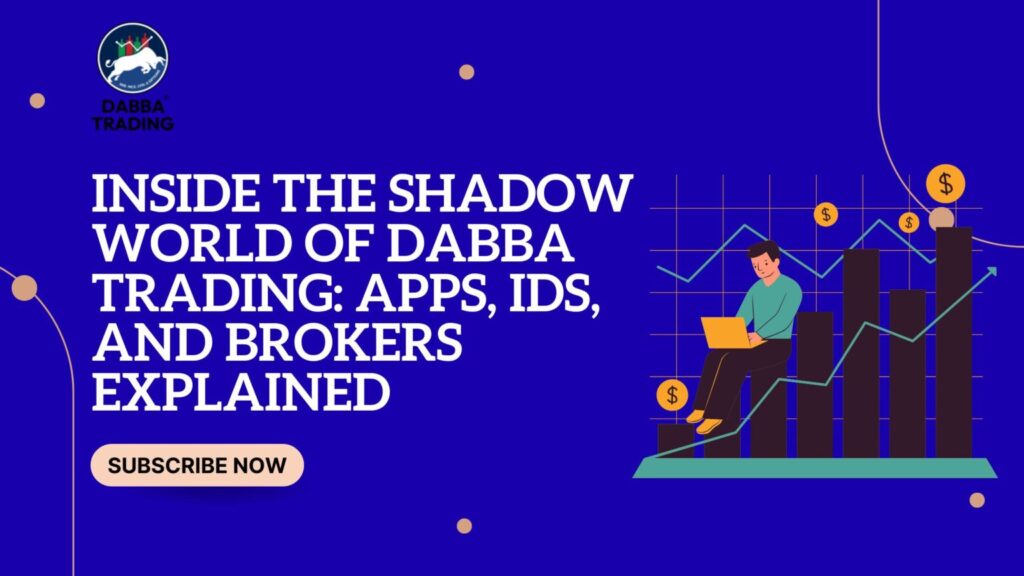
Inside the Shadow World of Dabba Trading: Apps, IDs, and Brokers Explained
From legitimate stock trading to cryptocurrency investments, technology has made access to markets easier than ever. But alongside legal innovations, an underground ecosystem has emerged , dabba trading. While traditionally run via paper slips or informal brokers, today’s dabba networks often use apps, hidden IDs, and encrypted messaging. This shift has given the old system a dangerous new face.
This article dives deep into how the dabba trading app, dabba trading id, and dabba trading brokers operate, and why this gray market continues to draw attention despite its risks.
The Rise of the Dabba Trading App
Years ago, dabba trading happened mostly in back rooms of broker offices or through phone calls. But with smartphones becoming the primary tool for financial transactions, many underground operators have built or adapted dabba trading apps.
These apps often mimic legitimate stock trading platforms but run entirely outside regulated exchanges like NSE or BSE. Some are private APKs, shared only via encrypted links or word-of-mouth. They allow traders to place orders, track prices, and manage positions , all without an official market footprint.
Why Apps Made Dabba Trading More Accessible
- Ease of use: No more physical slips; a few taps and you’re in.
- Faster communication: Orders are executed instantly between participants.
- Broader reach: Apps can connect traders from different cities without meeting face-to-face.
The danger? These apps don’t follow any compliance protocols, meaning no investor protection if things go wrong.
Decoding the Dabba Trading ID
Just like your account number in a bank, a dabba trading id is your identity in this underground market. Unlike regulated trading accounts, dabba IDs aren’t linked to your PAN card or KYC documents. Instead, they are informal codes assigned by brokers to track transactions.
How Dabba Trading IDs Work:
- A broker assigns you a unique code.
- This code is used to record bets (buy or sell orders).
- Settlements are done in cash, often at the end of the day.
While the secrecy of IDs is what makes dabba trading attractive to some, it’s also what makes it dangerous. Without any regulatory record, you have no proof of your trades in case of disputes.
Who Are the Dabba Trading Brokers?
In the world of dabba trading, brokers are the linchpins. They’re not your usual SEBI-registered intermediaries. Instead, they act as middlemen who connect buyers and sellers, manage the betting pool, and ensure settlements.
Traits of a Typical Dabba Broker:
- Operates without any official license.
- Often has a network of local agents.
- Maintains a parallel book of trades separate from the official market.
With the entry of apps and messaging platforms, brokers can now manage hundreds of traders at once, making their networks even more powerful , and harder for regulators to trace.
The Appeal: Why People Still Risk It
Despite being illegal in many jurisdictions, dabba trading still thrives. Here’s why:
- Low transaction costs – No exchange fees or taxes.
- High leverage – Brokers often allow bets much larger than your deposit.
- Fast settlement – Usually in cash, within hours or by day’s end.
However, these advantages are deceptive. While you may save on official charges, you’re taking on risks that could wipe out your investment entirely.
The Legal & Financial Risks
If you use a dabba trading app or register with a dabba trading broker, you’re essentially stepping outside the protection of financial laws. This means:
- You could face legal charges for participating in unregulated markets.
- You could lose your money without any recourse.
- Authorities may track large cash transactions, leading to investigations.
Recent crackdowns have shown that technology may make dabba trading faster, but it also makes it easier for cybercrime units to detect unusual patterns.
The Tech Behind the Underground
It’s surprising how sophisticated some dabba trading setups have become. Many now use:
- Cloud servers to run trading apps.
- End-to-end encryption for messages.
- VPNs to mask broker locations.
Some networks even mimic live market prices in real-time, so traders feel they are operating in an authentic market environment , until disputes arise.
The Psychology of Dabba Trading
Beyond financial incentives, there’s a psychological lure. The thrill of fast money, the sense of exclusivity from having a secret dabba trading id, and the perception of beating the system make this a tempting game for some. Unfortunately, this “game” can lead to major losses, debt, and even legal trouble.
Can Dabba Trading Ever Be Regulated?
Some experts argue that instead of fighting the system endlessly, regulators should look into integrating certain high-demand features of dabba trading, such as low fees and instant settlements, into the legal market. However, until such reforms happen, dabba trading will remain in the shadows.
Conclusion
The modern dabba trading app may look sleek and user-friendly, the dabba trading id may give you an air of exclusivity, and the dabba trading brokers may seem trustworthy, but the risks are enormous. If you want to trade, stick to regulated platforms where your money is protected and your rights are recognized.
The underground may seem exciting, but remember: in dabba trading, the odds are stacked in favor of the house, and the house is not on your side.
